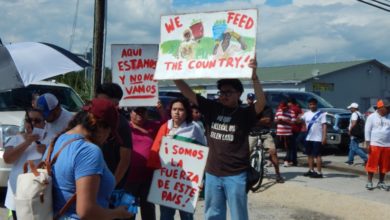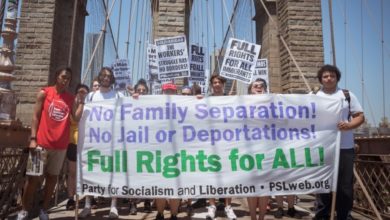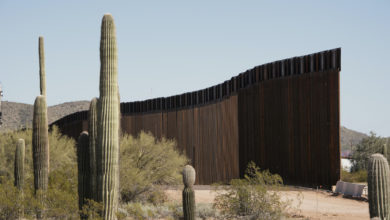“¿Que queremos? ¡Ciudad Santuario! ¿Cuando? ¡Ahora!” was the chant that rang out from the steps of New Haven City Hall on Oct. 2, as a crowd of 50 people gathered to demand immediate action from the Board of Alders on an ordinance establishing strong sanctuary city legislation.
Organizers have met for over two years to build a coalition, collected over 2,000 signatures, held meetings with city alders, shared their stories, and crafted language for a law that would protect people in New Haven, Connecticut, from being asked about their immigration status or handed over to ICE for deportation. The ordinance would create a “don’t ask, don’t tell, don’t arrest” policy for the New Haven Police Department, preventing officers from asking for or using any information about a person’s immigration status. It would prevent local police from acting as immigration officers by requiring them to not comply with ICE detainer orders. Over the course of the campaign, many undocumented residents told stories of how they were afraid to go to the police when they had been victims of a crime.
The ordinance would also extend the same prohibitions to all city employees. On Aug. 14, Mayor Toni Harp introduced an executive order implementing some of the policies outlined in the ordinance. While the executive order was welcomed by activists as a step forward, it also represented a common behavior of politicians in New Haven: taking credit for the actions and hard work of activists. Harp, who just lost the Democratic primary in the 2019 mayoral election, often speaks in favor of progressive ideas to the press but time after time refuses to put pressure on the Board of Alders.
Among other things, the executive order does not explicitly protect people from being asked for social security numbers, which could be “a backdoor mechanism to identify documentation status” according to lawyers working with the campaign. The executive order also authorizes disclosure of information about residents when “authorized by law” while the proposed ordinance states “required by law.”
New Haven has a long history of fighting — and winning — in the struggle for immigrant rights. In 2007, it became the first city to issue resident ID cards after a long fight by activists. The Elm City ID card functions as a legal ID for any resident in New Haven. As part of the same fight, the New Haven Police instituted a general order that police wouldn’t ask people about documentation status, but many immigrants have reported that the NHPD is not strictly enforcing this policy or training its new officers on it.
The Board of Alders is taking no action on the sanctuary city ordinance. Board of Alders Majority Leader Richard Furlow told the New Haven Independent after the rally that “there is no such ordinance currently before the board.” Alder Jeanette Morrison has called for meetings and discussions before introducing any legislation, a months-long process that would only delay what residents are demanding.
At the rally, Miguel Castro, a City Council member from nearby Meriden, called on New Haven alders to take up the legislation immediately: “Enough with all these dialogues, it is now the time to come back to the table and fulfill our responsibilities.”
PSL member Chris Garaffa spoke and made reference to how the Board of Alders similarly delayed the implementation of a Civilian Review Board to provide community oversight of police. He reviewed how activists had to stage sit-ins in the mayor’s office and pack or sometimes disrupt Aldermanic meetings in order to get the legislation properly written and passed: “This ordinance has to happen. … We are here on your steps, and we will take action to make you take action. We need this ordinance, now.”
The fight for a sanctuary city ordinance will go a long way in protecting the rights and safety of all residents of New Haven, and could set an example for movements in cities around the country. As Austin Bryniarski of the New Haven Food Policy Council put it at the rally, “a sanctuary ordinance, when it’s put into a law and not an executive order, is a statement that our city values people’s safety.”






